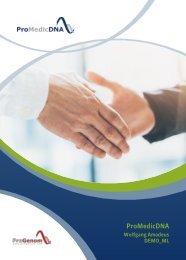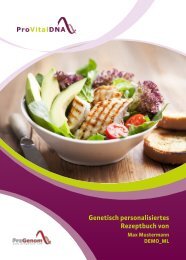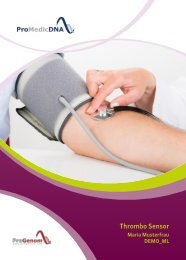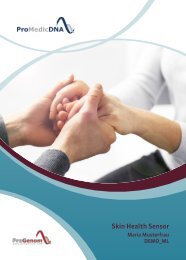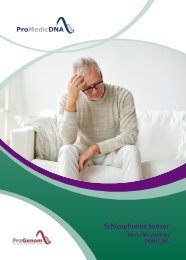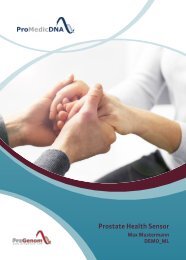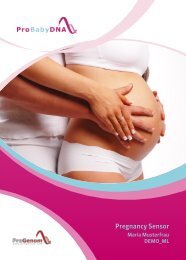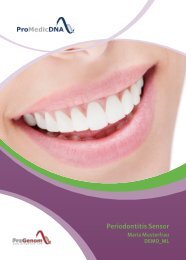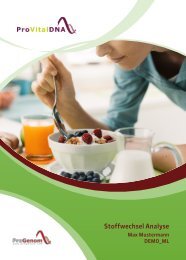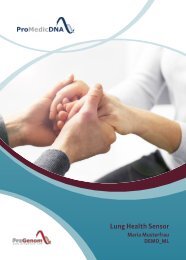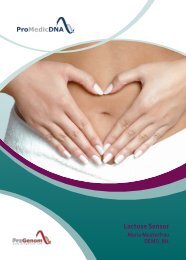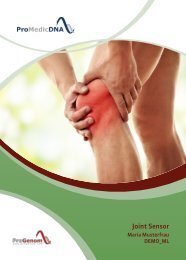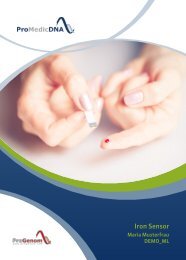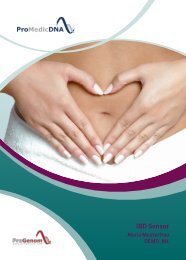- Page 1 and 2:
Lifestyle genetic analysis Maria Mu
- Page 3 and 4:
Lifestyle genetic analysis Personal
- Page 5 and 6:
BODY WEIGHT GENES An analysis and l
- Page 7 and 8:
physical activity / calorie reducti
- Page 10 and 11:
BODY WEIGHT GENES YOUR NUTRITION TY
- Page 12 and 13:
ANALYSIS OF TYPE Carbohydrate or fa
- Page 14 and 15:
Diet: Balanced diet: carbohydrates
- Page 16 and 17:
Your Type: MODERATE CALORY INTAKE T
- Page 18 and 19:
BODY WEIGHT GENES YOUR NUTRITION TY
- Page 20 and 21:
ANALYSIS OF STRATEGY Muscles, calor
- Page 22 and 23:
BODY WEIGHT GENES YOUR NUTRITION TY
- Page 24 and 25:
SETTING GOALS Your genetic weight l
- Page 26 and 27:
NUTRITION Dieting rules Can I cheat
- Page 28 and 29:
- - NutriMe Weight Management Your
- Page 30 and 31:
WEIGHT ICONS Losing weight with the
- Page 32 and 33:
- - Cookbook Menu plans and recipes
- Page 34 and 35:
- - The Menu Portal What it contain
- Page 36 and 37:
LOSING WEIGHT WITH THE HELP OF THE
- Page 38 and 39:
Step 3) How do you follow these gui
- Page 40 and 41:
Step 6) How does the food item syst
- Page 42 and 43:
LOSING WEIGHT WITH THE HELP OF THE
- Page 44 and 45:
Menu plan: Traditional Meal Item We
- Page 46 and 47:
Menu plan: Italian Meal Item Weight
- Page 48 and 49:
Menu plan: Oriental Meal Item Weigh
- Page 50 and 51:
Snacks, that can be eaten any time
- Page 52 and 53:
Snacks, that can be eaten any time
- Page 54 and 55:
Snacks, that can be eaten any time
- Page 56 and 57:
BODY WEIGHT GENES YOUR NUTRITION TY
- Page 58 and 59:
EXERCISE Exercise The goal of aerob
- Page 60 and 61:
Example of a training plan with 3 s
- Page 62 and 63:
Leisure activities and housework Tr
- Page 64 and 65:
EXERCISE Adjustment phase and stabi
- Page 66 and 67:
Leisure activities and housework Tr
- Page 68:
Determining your optimal heart rate
- Page 71 and 72:
NUTRITION GENES How your genes infl
- Page 73 and 74:
Your Result RESULT You have chosen
- Page 75 and 76: Nutritional Genes - Milk SYMBOL rs
- Page 77 and 78: FOOD INGREDIENTS The effects of ind
- Page 79 and 80: NUTRIGENETICS Nutritional Genes - H
- Page 81 and 82: NUTRIGENETICS Nutritional Genes - V
- Page 83 and 84: Nutritional Genes - Oxidative Stres
- Page 85 and 86: NUTRIGENETICS Nutritional Genes - B
- Page 87 and 88: NUTRIGENETICS Nutritional Genes - B
- Page 89 and 90: NUTRIGENETICS Nutritional Genes - C
- Page 91 and 92: NUTRIGENETICS Nutritional Genes - E
- Page 93: Summary ß-carotene ß-Carotene ß-
- Page 97: Summary Magnesium Magnesium Magnesi
- Page 101: Summary Oxalic acid Oxalic a. Oxali
- Page 105: Summary Lactose Lactose Lactose Lac
- Page 109 and 110: Alcohol Alcohol is a substance that
- Page 111 and 112: Sucrose This sugar contains calorie
- Page 113 and 114: TABLE How food types are evaluated
- Page 115 and 116: and accurate list of ingredients. A
- Page 117 and 118: DIETARY SUPPLEMENT This chapter des
- Page 119 and 120: This chart shows the shortage of im
- Page 122 and 123: BODY WEIGHT GENES YOUR NUTRITION TY
- Page 124 and 125: EPIGENETICS Epigenetics - Regulatio
- Page 128 and 129: BODY WEIGHT GENES YOUR NUTRITION TY
- Page 130 and 131: METABOLISM Phase 1 Detoxification f
- Page 132 and 133: METABOLISM Oxidative stress and fre
- Page 134 and 135: METABOLISM Substances and risks Eve
- Page 136 and 137: Nutritional Genes - Oxidative Stres
- Page 138 and 139: METABOLISM Prevention PHASE 2 DETOX
- Page 140 and 141: BODY WEIGHT GENES YOUR NUTRITION TY
- Page 142 and 143: Telomeres and biological age BIOLOG
- Page 144 and 145: adapted diet as best as possible. Y
- Page 146 and 147: BIOLOGICAL AGE Prevention What can
- Page 148 and 149: BODY WEIGHT GENES YOUR NUTRITION TY
- Page 150 and 151: STRESS AND BURNOUT SYNDROME Stress
- Page 152 and 153: STRESS Genes relevant to stress Sev
- Page 154 and 155: Lack of close, supportive relations
- Page 156 and 157: How you should exercise Exercise re
- Page 158 and 159: BODY WEIGHT GENES YOUR NUTRITION TY
- Page 160 and 161: Athletics gene 1 (ACTN3 SNP rs18157
- Page 162 and 163: Summary of the genetic predispositi
- Page 164 and 165: VO2max Maximal oxygen uptake Cells
- Page 166: VO2max Result OXYGEN UPTAKE (VO2max
- Page 169 and 170: OXIDATIVE STRESS Athletes produce c
- Page 171 and 172: Summary of effects ➤ You have a s
- Page 173 and 174: INFLAMMATORY RESPONSE AND INJURY Ce
- Page 175 and 176: Summary of effects ➤ The aggressi
- Page 177 and 178:
RECOVERY PHASE This chapter gives y
- Page 180 and 181:
BODY WEIGHT GENES YOUR NUTRITION TY
- Page 182 and 183:
CALORIES Ideal calorie distribution
- Page 184 and 185:
CALORIC DISTRIBUTION Your optimal c
- Page 186 and 187:
the order form and no genes are tes
- Page 188 and 189:
SCHEDULE The schedule of the perfor
- Page 190 and 191:
COMPETITIONS Competition diet The d
- Page 192:
Strategic plan for your athletic ca
- Page 195 and 196:
FOOD LIST This individual food list
- Page 197 and 198:
Green apple icons Green apple icons
- Page 200:
g per item F Recommendations to los
- Page 204:
g per item F Recommendations to los
- Page 208:
g per item F Recommendations to los
- Page 212:
g per item F Recommendations to los
- Page 216:
g per item F Recommendations to los
- Page 220:
g per item F Recommendations to los
- Page 224:
g per item F Recommendations to los
- Page 228:
g per item F Recommendations to los
- Page 232:
g per item F Recommendations to los
- Page 236:
g per item F Recommendations to los
- Page 240:
g per item F Recommendations to los
- Page 244:
g per item F Recommendations to los
- Page 248:
g per item F Recommendations to los
- Page 252:
g per item F Recommendations to los
- Page 256:
g per item F Recommendations to los
- Page 260:
g per item F Recommendations to los
- Page 264:
g per item F Recommendations to los
- Page 268:
g per item F Recommendations to los
- Page 272:
g per item F Recommendations to los
- Page 276:
g per item F Recommendations to los
- Page 280:
g per item F Recommendations to los
- Page 284:
g per item F Recommendations to los
- Page 288:
g per item F Recommendations to los
- Page 293 and 294:
BODY WEIGHT GENES YOUR NUTRITION TY
- Page 295 and 296:
SCIENCE The science of genes and ex
- Page 297 and 298:
Statement 4 Genes influence how our
- Page 299 and 300:
Weight loss program FABP2 - Fatty a
- Page 301 and 302:
ADRB2 adrenoceptor beta 2, surface
- Page 303 and 304:
APOA5 - Apolipoprotein A-V (rs66279
- Page 305 and 306:
Shiwaku K, Nogi A, Anuurad E, Kitaj
- Page 307 and 308:
➤ GFHEV-Leitlinien. ➤ Gidh-Jain
- Page 309 and 310:
SCIENCE Epigenetics ➤ AAPS J. 201
- Page 311 and 312:
Detoxification SCIENCE CYP1A1 - Cyt
- Page 313 and 314:
GSTT1 - glutathione S-transferase t
- Page 315 and 316:
COMT - Catechol-O-methyltransferase
- Page 317 and 318:
PPARG (rs1801282) RES Genotype POP
- Page 319 and 320:
Athletic performance Angiotensin co
- Page 321 and 322:
Maximal oxygen uptake (VO2max) Nucl
- Page 323 and 324:
CRP - C-Reactive Protein (rs3093066
- Page 325 and 326:
GSTT1 - glutathione S-transferase t
- Page 327 and 328:
SCIENCE Inflammation and risk of in
- Page 329 and 330:
IL6R - interleukin 6 receptor (rs22
- Page 331 and 332:
BODY WEIGHT GENES YOUR NUTRITION TY
- Page 333 and 334:
- - NutriMe Complete How it works E
- Page 335 and 336:
- - Optimized absorption into the b
- Page 337 and 338:
- - NutriMe Complete - Proper care
- Page 339 and 340:
- - NutriMe Complete - The highest
- Page 341 and 342:
- - Effect of your individual micro
- Page 343 and 344:
- - Your daily requirement of micro
- Page 345 and 346:
- - Follow us on facebook! Follow u
- Page 347 and 348:
VERSION HISTORY Science continues t
- Page 349 and 350:
➤ V455 - Layout improvements, Des
- Page 351 and 352:
CUSTOMER SERVICE Customer Service Q
- Page 353 and 354:
NOTES:
- Page 355:
0000000000000 Lifestyle genetic ana




